I STOLE THE STONE OF DESTINY |
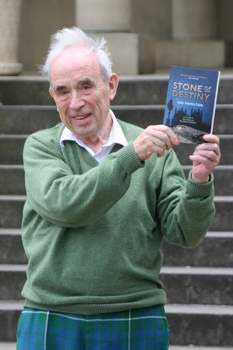 |
In 1950, Ian Hamilton almost sparked a revolution by stealing Scotland's most revered stone from Westminster Abbey. After dumping it, he vowed he would never look at it until Scotland was independent. Today, he reveals why he will set eyes on the Stone of Destiny after 58 years. Straddling his motorbike, 82-year-old Ian Hamilton is still a bit of rebel at heart. But few would know him as the man who led the most daring theft in modern Scottish politics, armed with nothing more than a jemmy and a couple of clapped-out getaway cars. Ian stole the Stone of Destiny. He was ringleader of a Robin Hood-style band of nationalists who nicked the historic chunk of sandstone from its home in Westminster Abbey on Christmas Day, 1950. They smuggled it back to Scotland under the noses of England's finest detectives, sparking celebrations on the streets and fears of a Scottish uprising. |
The Government hosted a reception at Edinburgh Castle in its honour and Ian's book about his escapade - also called Stone Of Destiny - is being relaunched for the occasion, complete with a foreword by First Minister Alex Salmond. Ian will be guest of honour at the glittering event on June 23, where he will get to see the stone again for the first time since he abandoned it at Arbroath Abbey after the daring theft. He said: "I always said I didn't want to see it again until it was part of an independent Scotland. "But independence is now inevitable. I'm not going to wait for the technicality that it hasn't actually happened. "The great thing about the stone is that it transcends politics. Regardless of our political views, Scots recognise that there is something that binds us together." The film's release means Ian has found himself a celebrity all over again - but this time he is going to enjoy it. He said: "It's only now that I'm in my 80s that I will talk about the Stone of Destiny. "It threw such a shadow that I would have become an invisible person. "People referred to me for years as the 'stone man' no matter what I was doing. "I had to fight for my own identity and the only way to do it was to refuse to speak about the stone. "I'm comfortable with it now because I made a separate life for myself but it wasn't easy." |
Ian eventually became a successful criminal lawyer and spent more than 50 years as one of the country's most respected QCs before retiring. The father-of-four now lives a quiet life in Argyll with his wife Jeannette. With his fellow conspirators - students Gavin Vernon, Alan Stuart and Kay Matheson - he became a national hero to some but an outcast to others. Ardent nationalists, they were determined to "repatriate" the Stone of Destiny, an ancient 336lb block which had been used for centuries for the coronation of Scottish kings.
|
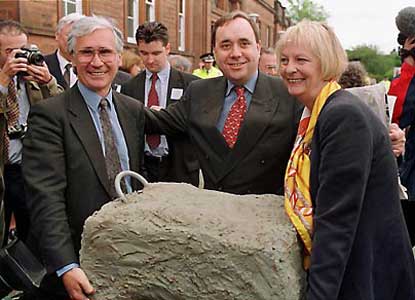 |
It was captured in 1296 by Edward I - known as the Hammer of the Scots - who placed it in Westminster Abbey. It had remained there ever since, encased inside the coronation chair used for English monarchs. "The fact there is all this interest 60 years later proves that we were right." But their comic-strip plans did not quite live up to their grand ideals. He said: "There's no way we were great criminals. When I look back now I have to laugh at the absurdity of it all. "I've defended a lot of daft people during 30 years as a criminal lawyer but I doubt very much if I've defended anyone who was as daft as we were then. "The jails are full of daft people but we got away with it. They didn't even prosecute us. "There was such a reaction in Scotland - they were terrified the Scots would have risen up if we had been sent to jail." The four nervous raiders arrived at Westminster Abbey under the cover of darkness on Christmas Day 1950 and opened a side-door with a crowbar. When a passing policeman looked vaguely suspicious of Ian and Kay loitering at a getaway car, they started kissing, convincing the cop they were just a courting couple. |
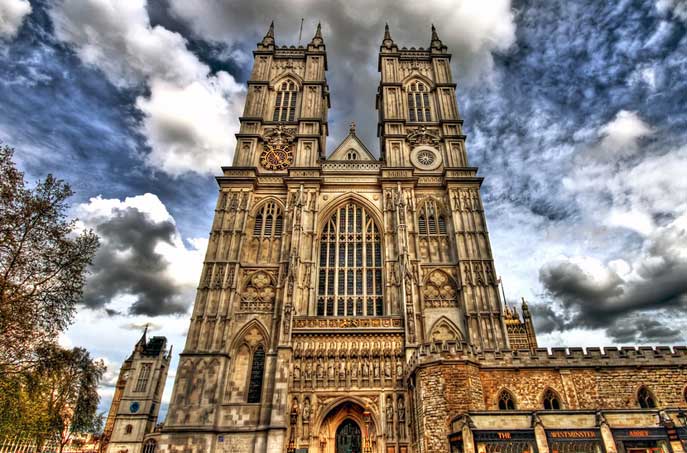 |
Ian said: "These were the days before hi-tech security. "Anyway, why would anyone ever think about breaking into Westminster Abbey? "There was a night watchman who occasionally made patrols but I imagine he spent most of his time with his feet up against an electric fire, reading a book. "I'd been caught by him a couple of nights before but he just thought I was a drunk and put me out." While Kay waited outside, the others started trying to move the heavy stone but managed to break it in the process. Ian said: "When it came out from under the chair, it fell on to the floor with a big bump and broke. "They say it had been damaged previously by a suffragette bomb. "I would like to say that my heart sunk when we broke the stone but it actually made it easier to carry in two pieces. Kay took the smaller piece away in her car. "We hid the bigger piece at the edge of a wood near London while things calmed down a bit. "But by the time we went back to collect it, a gypsy camp had sprung up around it." When they finally succeeded in smuggling the stone back to Scotland, they had no idea what to do with it. |
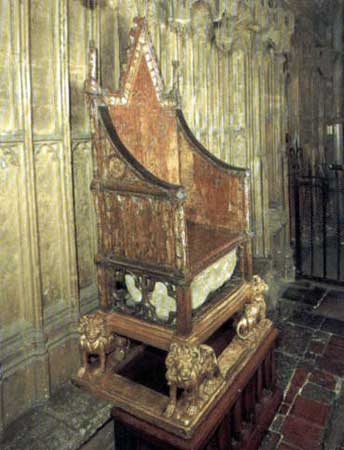 |
As the police closed in on the unlikely band of thieves, they abandoned it at the high altar of the ruined Arbroath Abbey, where the declaration of independence was signed in 1320. Ian said: "We had made absolutely no attempts to cover our tracks. "The police just went into the Mitchell Library in Glasgow and asked if anyone had been showing a special interest in the Stone of Destiny. "I'd researched the whole business there. They checked the records and found I had borrowed every book on Westminster Abbey." When Hollywood director Charles Martin Smith read Ian's book about the adventure, he decided it would make a great comedy movie. The film - with Stardust actor Charlie Cox as Ian and Robert Carlyle as his nationalist pal John McCormick - got rave reviews after a screening at Cannes. It is now set for general release in November but will receive its world premiere in Edinburgh on June 21. The stone was finally returned to Scotland in 1996 and has been kept on public display at Edinburgh Castle since. |
But while Ian will be reunited with stone at the film's reception, he and his co-conspirators never met up again after their adventure was exposed. Ian said: "We were only united for this campaign then went our separate ways. "We were all ridiculously young, of course. I'm a different person now. "But I think the youth of Scotland still have that passion. Given the need, they will always rise up and do something." |
THE FEAST HAS FINISHED |
For me the feast has finished and the lamps have expired. A book I wrote has lasted sixty years and it has been made into a film. In a touching scene in the film, taken from real life, my father says he is proud of me. My real father would have been proud too. He loved books. Now I can turn my back on what I have done. Let it be known that the film of the Stone of Destiny will be shown all over the world. It did not make the official list at the Cannes Film Festival but was shown in a small side theatre. By the third showing the international film audience stood and cheered. Odeon signed it up for exhibition in the UK. It is on release in Scotland now and shortly will be seen in England. At the Toronto Film Festival, the largest in the English speaking world the audience gave it a standing ovation, and the same thing happened at the Vancouver Festival. I insisted that the Scottish opening be here in Oban where it played to a full house. Charles Martin Smith, director, screen writer and Hollywood giant had to leave immediately after for its next opening in ANKARA. (Look it up on the map. It’s in Turkey) The Guardian on Tuesday 14th October gave it a thoughtful review. Among other things they quoted accurately what I feel about the whole matter:- Hamilton is dismayed, however, by the continued fascination with the raid. He volunteered with the RAF during the war, where 55,000 young men died in bomber command alone. “I did something for my country, as they did - and I am remembered and they are forgotten? This was an ancient wrong that had to be righted, I was just the person who did it.” That is my true feeling. I will be glad of a closure. But how has it been received? One of the English Sunday papers rated it four out of five. The International Movie Data Base has rated it eight out of ten. These are exceptional ratings for a low budget film….for any film. I did not read the Herald and the Scotsman revues but they have caused offence among those who love this film. The accents weren’t right was one complaint. Even if that is so it won’t be noticed in Canada. Then you don’t take the train to London via the Glen Finnan viaduct, but that is just a little bit of advertising for the tourist industry. The few who see it in Scotland will be outnumbered by the vast audiences elsewhere. It is only two critics who have disliked it, not the people who have watched and loved it. Poor Scotland! It turns out film critics whose vision stops at the parish boundary. I am proud of the film. As Professor Tom Devine and I are quoted as saying in the Guardian it all happened in a different time in history, but it is the history of us all. |
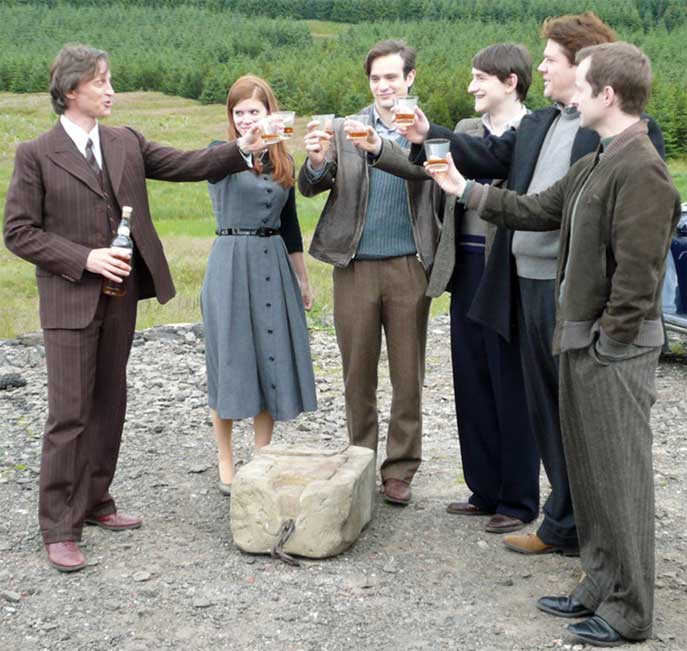 |
THE DESOLATION OF SUCCESS |
This ending poses me personally with a great difficulty. Success is more difficult to deal with than failure. With failure you can pick yourself up and start again. Success gives you no such option. It leaves you with nowhere to go. I set out to wake up my country. Now Scotland is awake and fit to take on all comers. We are alive again. I do not claim it was because of me. I claim only to have been one of the early fighters. Now I am like a child wondering what skills I have and what to do with them. When Robert Bontine Cunninghame Graham wrote his great essay on SUCCESS he knew that success brought its own desolation. I am an accomplished public speaker. Maybe I’ll take that up. Does anyone know where I can find an agent? |
 |
To read Ian Hamilton's fantastic blog CLICK HERE |
© Paisley Tartan Army 2008-09
